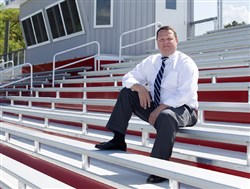VOL. 39 | NO. 40 | Friday, October 2, 2015
Pinkston sees new Nashville in his old neighborhood
By Sam Stockard

Pinkston sits in the stands of new bleachers at Glencliff High School.
-- Michelle Morrow | The LedgerMetro School Board member Will Pinkston feels at home at La Hacienda Mexican restaurant on Nolensville Road. It’s still home, even after going through dramatic cultural shifts over two decades.
He grew up in the neighborhood in the 1980s when it was mostly white and lower middle class, graduating from John Overton High School before heading off to the University of Tennessee and a career in journalism, government work and public relations.
Pinkston, 43, whose District 7 takes in all of South Nashville, lives in the 12South area with his family now, but his heart still lies in the Nolensville Road corridor where he says a “remarkable transformation” has taken place over the last 20 years.
“You can see it in La Hacienda, you can see it in Istanbul down the block. You can see it in House of Kabob down the next block. You can see it in Hajib, an Indian restaurant,” Pinkston says as Spanish music floods the conversation on the restaurant’s patio.
During the interview, Stephanie Teatro and Lindsey Harris, co-directors of the Tennessee Immigrant and Refugee Rights Coalition, stop to say hello. Pinkston says the group is invaluable in working with him amid shifting demographics in Nashville.
“This has become the international corridor of the city,” Pinkston says. “This is pound for pound, block for block one of the most diverse sets of neighborhoods in the state and the country. And because of that, schools in my district are some of the most diverse schools in the state and in the country.”
In Metropolitan Nashville Public Schools, 15 percent of the students are classified as English Language Learners, meaning they speak some other language at home and are just starting to speak English. In comparison, the state average is 4.5 percent.
More than 25,300 Metro students, about 31 percent, speak languages other than English. Officials estimate children speak 120 different languages, most of them Spanish, Arabic, Kurdish, Somali and Vietnamese.
Officials believe those numbers will increase, and soon, as thousands of Syrian refugees flow out of that country torn by civil war. They’re making their way through Europe, and many of them likely will wind up in Nashville, schools officials say.
Consequently, Metro schools are by far the most diverse in the state and among the most diverse in the nation. But rather than complain about national immigration shortcomings or run from this new reality in the district he represents, Pinkston embraces it.
“With that comes profound challenges and opportunities, and if we can somehow deliver the highest-quality education services to the youngest, new Americans who live in the neighborhoods where I came from, then I think we’ve done amazing work,” Pinkston says.
“We’re not there, but we’re on our way, and I want it to happen with a sense of urgency.”
Pinkston sponsored a school board resolution last year for the system to develop an “English Learner Innovation Plan” outlining $16 million in expenditures to improve instruction to these students.
Yet another $23 million could go toward reducing class sizes in schools with large numbers of English-learner students, according to an essay Pinkston wrote. Such a plan would have to be phased in over several years, but he contends the system needs to start immediately.
Metro Nashville Public Schools officials presented their ideas – minus cost estimates – to board members recently, an effort focusing on students’ emotional, cultural, social and academic needs.
Plans involve everything from English learner registration centers where the school system would get an early start in working with children and parents; classroom tutors; weekly evening workshops with families; extended school hours and even laptop computers for every English learner to work on linguistic skills.
“I love the emphasis on extended learning time,” Pinkston says.
However, he expresses concerns about the amount of money it would take to put the plan into action and calls for a “bigger coalition of political support,” including a briefing with new Mayor Megan Barry and the Metro City Council to increase support for the English learner proposal.
Board Chairwoman Sharon Gentry, on the other hand, says Metro has problems across the system and should look at spreading it district-wide.
For instance, homeless, low-income and black students could benefit from the proposal, Gentry says, adding she wants to see district officials come up with ways to measure student success for such a program.
The board chair also appears leery about jumping into the English learner proposal without testing it.
“Do we go whole hog or is there going to be a model school?” she asks.
District officials are expected to report back to the board with more details before any action is taken.
Still, Pinkston says he feels “a moral obligation” to spend each day pushing Metro schools management to improve offerings for English learners.
In spite of language barriers, these students are required to take the state’s standardized tests, which are used to evaluate teachers, schools and, ultimately, the school system.
“If we can somehow crack the code, so to speak, in EL instruction and find a way to deliver the highest-quality education to our youngest new Americans, then all boats will rise,” Pinkston says.
Sam Stockard can be reached at [email protected].